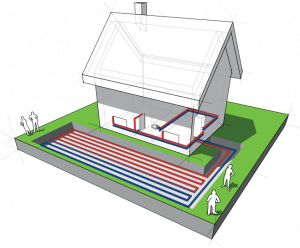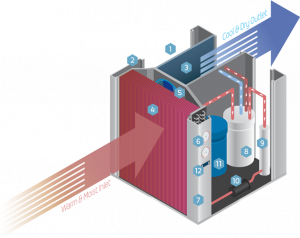Ground Source Heat Pump Vs Air to Water Heat Pump
A heat pump can be used as an effective and efficient replacement to an existing oil or gas boiler as over 70% of the heat generated by a heat pump is extracted for either air, ground, or water. When deciding on the best heat pump source for your home, there are a number of considerations before making a purchase. The first things that will probably come to mind will be:
- How much does it cost for the heat pump and for its installation?
- Do I have the available space (both inside and outside) to make this a viable option?
- How quickly will I get a return on my investment?
Once you have answered these questions, you are on your way to making an informed decision about purchasing a heat pump for your home. But will it be a ground source heat pump or an air to water heat pump? Let’s look at both types of heat pumps in detail.
Ground Source Heat Pump

Ground Source Heat Pump
As the name suggests, this type of heat pump absorbs the heat from the ground into a liquid (called TTF or brine) that circulates in an underground pipe system. The heat is then passed through a refrigerant which is then compressed causing its temperature to increase. This heat is then transferred to the radiators or an underfloor heating system to heat your home. It can also be used to heat your water and as there is a consistent temperature underground, you can use this system all throughout the year.
Do I have enough space for a ground source heat pump?
While you do not necessarily need a lot of space, you will need space in your garden to either dig a trench (for a ground loop) or to bore a hole (for a probe). Best to avoid areas that have tree roots which can damage the pipes. You will also need space within your house for the heat pump unit which contains a hot water cylinder and other key components. The biggest difference is for installers as they must arrange to carry out the civil works to supply the source from the ground as opposed to the air source option. There is a marginal benefit by opting for ground source heat pumps but this must be factored against the additional works costs
Air to Water Heat Pump

Air to Water Heat Pump
An air to water heat pump absorbs heat from the air outside into a refrigerant fluid (the same fluid used in a ground source heat pump). The temperature increases as the fluid is compressed and is then usable as heating your radiators, or for hot water in your home. They can extract heat from air temperatures as low as -15 degrees celsius which means you can have a warm home with hot water for the family 365 days a year.
Do I have enough space for an air to water heat pump?
The unit itself will need space to be mounted to an external wall or can be placed on the ground, provided an appropriate base is built. Good airflow is required around the unit to ensure that it can work efficiently. Units can be monobloc versions where all components are externally situated or a spit system where key components are inside and the fan is fitted externally
Will this make a lot of noise outside my house?
Noise is a very personal issue as some people are very sensitive to it. It is also true that some heat pumps are manufactured to be small however this means all components are squeezed into a box making the noise more audible. The noise from a well manufactured heat pump is similar to the sound of a fridge if you’re standing within a couple of metres. This can increase in volume if the unit is working extra hard, for instance, when the temperature is low or when producing high temperature water.
Now that you have a better understanding of these differing types of heat pump, let’s look at the grants available to help with the switch from fossil fuels to renewable energy.
Financial Support Schemes
Ireland has made a promise in the European Green deal to have 80% of the country running on renewable energy by 2030. It has also committed to becoming carbon neutral by 2050. With this in mind, the government has provided grants to help with these promises.
Switching to either type of heat pump will help lower your carbon footprint as well as your heating bill due to heat pumps taking their energy from renewable resources. This way we are all doing our bit to help achieve our country’s targets. Let’s now look at what options are available for people about to make this investment in their home and our country’s future.

Currently, the Sustainable Energy Authority of Ireland (SEAI) offer a number of grants to homeowners:
- Grant towards your technical assessment (which is required before you can apply for a heat pump grant).
- Grants towards the cost of a range of heat pumps including ground source heat pumps and air to water heat pumps.
Each individual grant offers a fixed value which can be found here
Please note that your home should be well insulated to benefit from a heat pump. Therefore, the technical assessment must be carried out to ensure that your home qualifies for one of the SEAI grants. You can improve the efficiency of your home by installing insulation and double or triple glazed windows. Both actions will reduce your heat loss substantially. Your home getting as much radiant heat as possible will also help ensure that your home is warmer than a house located in a very sheltered area.
Why MasterTherm?
Heat pumps can be used in any property that requires heating or cooling but they are primarily used to provide hot water or to power a heating system. Heat pumps are also increasingly being used in commercial and industrial settings replacing traditional fossil fuels. A MasterTherm heat pump can be an efficient way of repurposing heat energy that otherwise would have been wasted. This will make businesses more sustainable and economical. MasterTherm heat pumps are ultra-quiet, have a 7-year warranty, give you lower heating bills and can be controlled easily from a tablet or phone because they use inverter technology.
MasterTherm will design and tailor a personalised heating system to suit your property’s requirements, whether it’s for a complex monitored heating and cooling system using rejected heat or a central heating system with a simple hot water demand. MasterTherm will ensure that you get the maximum benefit from your heat pump system.
If you’re looking for a heating and hot water solution for a large complex building we may suggest multiple heat pumps working together. If you are unsure about how to start the journey to renewables using heat pumps, contact us and we can start by creating a bespoke design for your heating system.
